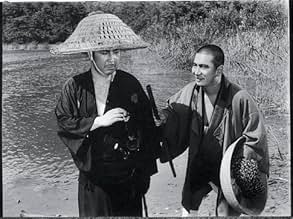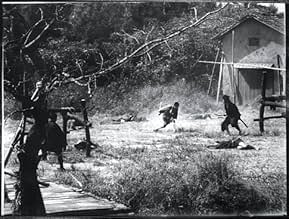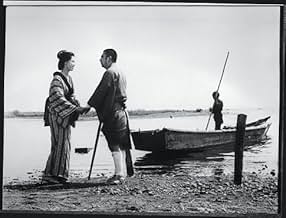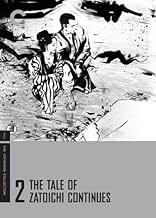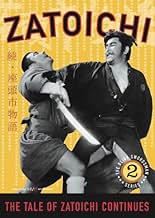IMDb-BEWERTUNG
7,2/10
2945
IHRE BEWERTUNG
Füge eine Handlung in deiner Sprache hinzuThe blind masseur and swordsman, Zatoichi, learns of a powerful political figure's secret and is quickly tailed by a group of killers.The blind masseur and swordsman, Zatoichi, learns of a powerful political figure's secret and is quickly tailed by a group of killers.The blind masseur and swordsman, Zatoichi, learns of a powerful political figure's secret and is quickly tailed by a group of killers.
- Regie
- Drehbuch
- Hauptbesetzung
Yaeko Mizutani
- Setsu
- (as Yoshie Mizutani)
Tomisaburô Wakayama
- Nagisa no Yoshiro
- (as Jô Kenzaburô)
Empfohlene Bewertungen
The following review is an extract from the book "Shintaro Katsu´s Zatoichi: Complete guide to all movies", which is now available on Amazon.
Zatoichi (Shintaro Katsu), the famous and prodigious masseur and blind swordsman, has arrived in a new region after the adventures narrated in the first film. After confronting some arrogant soldiers, who throw him into the water when they discover him in the boat in which they were crossing a river, he is hired to massage the head of a samurai detachment. However, while he is doing this work, he indiscreetly discovers a secret of the lord ("I had never had a client like this one..."), so the samurai will persecute him with the intention of killing him.
(...)
Second part of a long line of films with the mythical blind masseur, hardened player and wandering swordsman Zatoichi as the protagonist. The actor who gives life to the character is, once again, the great Shintaro Katsu. The director of this second part is not Kenji Misumi, but another director (Kazuo Mori). The sequel to "Zatoichi monogatari" (shot the same year, 1962) is not at the same level as the original. There are some gaps in the story; for example, it is never quite clear why the samurai want to kill Zatoichi (What is the secret that the masseur has discovered about the lord? It must be such a big secret that not even the spectator has the right to know...
In any case, Zoku Zatôichi monogatari's viewing is a good opportunity to see Shintaro Katsu and Tomisaburo Wakayama (Zatoichi and Yoshiro, repectively), two greats of the sixties and seventies chambara, who were also brothers in real life.
Zatoichi (Shintaro Katsu), the famous and prodigious masseur and blind swordsman, has arrived in a new region after the adventures narrated in the first film. After confronting some arrogant soldiers, who throw him into the water when they discover him in the boat in which they were crossing a river, he is hired to massage the head of a samurai detachment. However, while he is doing this work, he indiscreetly discovers a secret of the lord ("I had never had a client like this one..."), so the samurai will persecute him with the intention of killing him.
(...)
Second part of a long line of films with the mythical blind masseur, hardened player and wandering swordsman Zatoichi as the protagonist. The actor who gives life to the character is, once again, the great Shintaro Katsu. The director of this second part is not Kenji Misumi, but another director (Kazuo Mori). The sequel to "Zatoichi monogatari" (shot the same year, 1962) is not at the same level as the original. There are some gaps in the story; for example, it is never quite clear why the samurai want to kill Zatoichi (What is the secret that the masseur has discovered about the lord? It must be such a big secret that not even the spectator has the right to know...
In any case, Zoku Zatôichi monogatari's viewing is a good opportunity to see Shintaro Katsu and Tomisaburo Wakayama (Zatoichi and Yoshiro, repectively), two greats of the sixties and seventies chambara, who were also brothers in real life.
Seen on YouTube in black and white and, checking on
IMDb, it is in black and white. Beautiful music as usual, captivating story as usual, good acting and, especially, notable female beauties such as Masayo Banri and Yaeko Mizutani, two very beautiful Japanese women. Mixture inspired by drama and action, worth seeing.
Return of Masseur Ichi, The (1962)
*** (out of 4)
Blind masseur Zatoichi (Shintaro Katsu) discovers the weakness of a lord and must fight off various assassins who fear he will give away that secret. This was a pretty interesting samurai film from director Kazuo Mori, which relies a lot on fantasy but most of all is just all action and nice swordplay. Katsu makes for a wonderful lead and the supporting roles are filled nicely. The cinematography stretched out the full 2.35:1 looks incredibly sharp and the fights are well staged even though I have a somewhat hard time seeing a blind person doing all that.
*** (out of 4)
Blind masseur Zatoichi (Shintaro Katsu) discovers the weakness of a lord and must fight off various assassins who fear he will give away that secret. This was a pretty interesting samurai film from director Kazuo Mori, which relies a lot on fantasy but most of all is just all action and nice swordplay. Katsu makes for a wonderful lead and the supporting roles are filled nicely. The cinematography stretched out the full 2.35:1 looks incredibly sharp and the fights are well staged even though I have a somewhat hard time seeing a blind person doing all that.
'The Tale Of Zatoichi Continues (1962)' works both as a stand-alone experience and a direct continuation of its predecessor, playing with similar themes but framing them through a lens soaked with regret. It's a shorter, more action-packed affair but it's still primarily a character study. The eponymous stoic swordsman unwillingly gets caught up in the kind of trouble that forces him to show off his skills, which tend to swiftly and decisively resolve his immediate issues. Most of his introspection surrounds the melancholy of the last movie's events. Towards the end, however, a new relationship is revealed that threatens to see history repeat itself. Katsu, who's still fantastic in the role, is joined by his brother - perhaps better known for the much pulpier 'Lone Wolf and Cub (1972-1976)' series - which results in most of the film's emotion. It's rather resonant, leaving the entire experience tinged in sadness. The focus on character is, essentially, what makes the film so successful. You care about all the major players and their struggles resonate with you. The narrative moves almost as swiftly as Zatoichi's sword, ultimately coming to an incredibly abrupt end, and it balances its tone perfectly. It isn't groundbreaking but it's very enjoyable. It's also very well-made. Its crisp black-and-white cinematography is often highlighted by stunning chiaroscuro lighting and absolutely perfect composition, its dialogue is to the point but never on the nose, and its acting is subtle but successful. When it comes to the action, the thing doesn't disappoint, either. Most of it is shot wide, allowing you to see every quick-moving moment uninterrupted, and the choreography dances between unbearable anticipation and samurai-slaying pay-off impeccably. It isn't perfectly clean, with the villains scrambling about in fear before they make their ill-fated attempt on our often almost clumsy but always keenly aware protagonist, which lends a lot of credence to the fact that it's supposed to involve a highly feared yet blind man. Overall, the picture is very entertaining. It won't change your life, but it'll make you smile more than once. 7/10
In the 1960s and 70s, the Japanese made about 500000 Zatoichi films (or so it seems) and I have thoroughly enjoyed them all, even though after a while they all seem to blend together in my mind. Some viewers, like me, will like the familiarity of the character and story, while I am sure others will feel like "if you've seen one you've seen them all". Regardless of your opinion, they are all well-constructed and fun to watch even if the basic premise of the greatest swordsman being totally blind is ridiculous--you just need to suspend disbelief and enjoy.
This is an early installment of the series and it's better than average because it actually has some continuity--making reference to the prior film in the series. Here, in a follow-up, you see Zatoichi pining for a long lost love and having an ultimate showdown with his main rival. Along the way, he falls afoul of a clan who is trying to kill him to keep their secret (their leader "has issues"). And, as usual, the film is filled with amazing sword fights as well as tender moments. This one won't disappoint and is one of the better Zatoichi films.
This is an early installment of the series and it's better than average because it actually has some continuity--making reference to the prior film in the series. Here, in a follow-up, you see Zatoichi pining for a long lost love and having an ultimate showdown with his main rival. Along the way, he falls afoul of a clan who is trying to kill him to keep their secret (their leader "has issues"). And, as usual, the film is filled with amazing sword fights as well as tender moments. This one won't disappoint and is one of the better Zatoichi films.
Wusstest du schon
- WissenswertesThe Tale of Zatoichi proved to be so popular that this sequel went into production the same year, 1962.
- VerbindungenFeatured in Best in Action: 1962 (2018)
Top-Auswahl
Melde dich zum Bewerten an und greife auf die Watchlist für personalisierte Empfehlungen zu.
- How long is The Tale of Zatoichi Continues?Powered by Alexa
Details
- Erscheinungsdatum
- Herkunftsland
- Sprache
- Auch bekannt als
- Zatoichi 2: The Tale of Zatoichi Continues
- Produktionsfirma
- Weitere beteiligte Unternehmen bei IMDbPro anzeigen
- Laufzeit
- 1 Std. 12 Min.(72 min)
- Farbe
- Sound-Mix
- Seitenverhältnis
- 2.35 : 1
Zu dieser Seite beitragen
Bearbeitung vorschlagen oder fehlenden Inhalt hinzufügen

